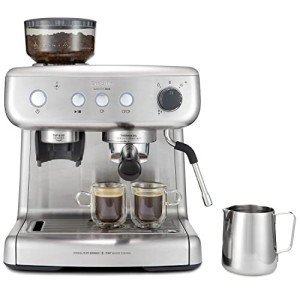The Art of Italian Espresso Machines: A Brewed Tradition
Italian espresso machines are not just appliances; they are an important part of Italy's abundant coffee culture, representing a blend of artistry, engineering, and design. Coffee aficionados around the globe acknowledge the importance of high-quality espresso, a staple of Italian life and food. This short article checks out the history, mechanics, types, and factors to think about when purchasing an Italian espresso machine, showing the depth of this beloved beverage and its brewing techniques.
History of Espresso Machines
The espresso machine's evolution dates back to the early 20th century in Italy, where coffee was not simply a beverage however a vital social routine. The preliminary attempts to brew espresso begun with simple, stove-top designs, slowly progressing into complex machines that might replicate the perfect brew.
- 1901-- The First Espresso Machine: The first steam-powered espresso machine, called the "Ideale," was developed by Luigi Bezzera. This machinery marked a turning point in espresso brewing.
- 1938-- The Lever Machine: The introduction of the lever machine made it simpler to manage the pressure utilized in espresso extraction, enhancing flavor consistency.
- 1947-- The Automatic Machine: Reaching more consumers, Gaggia released the very first automatic espresso machine, further popularizing espresso bars.
- 2007-- The Digital Age: Technological developments led to the birth of completely programmable machines, allowing users to customize their brewing settings to achieve an individualized coffee experience.
Secret Features of Italian Espresso Machines
Italian espresso machines embody accuracy, workmanship, and innovation. Here are some crucial components that highlight their significance:
| Feature | Description |
|---|---|
| Boiler Type | Identifies how heat is produced and maintained. Typical types consist of single boiler, dual boiler, and heat exchanger. |
| Group Heads | Where the coffee is brewed; commercial machines frequently have several group heads for performance. |
| Pressure Control | Important for accomplishing the perfect espresso; most machines run at 9 bars of pressure. |
| Frothing Capabilities | The steam wand enables for milk frothing, necessary for beverages like cappuccino and latte. |
| Construct Quality | The products used (stainless-steel, brass, etc) impact resilience and heat retention. |
Kinds Of Italian Espresso Machines
Selecting the right machine hinges on user choices, budget, and planned use. Below are the primary types of Italian espresso machines:
Manual Espresso Machines
- Pros: Offer complete control over the brewing procedure, permitting a personalized touch.
- Cons: Require ability and practice, can be labor-intensive.
Semi-Automatic Machines
- Pros: Provide a balance between automated and manual processes; users manage water flow.
- Cons: Can have a steeper learning curve than completely automatic machines.
Fully Automatic Machines
- Pros: Simplify the brewing process with push-button operations; perfect for novices.
- Cons: May compromise a few of the subtleties of manual brewing.
Super-Automatic Machines
- Pros: Grind, tamp, brew, and froth instantly; hassle-free for hectic lifestyles.
- Cons: Less control over the developing variables, potential for a less genuine espresso experience.
Buying Guide: Factors to Consider
Choosing the ideal Italian espresso machine can be overwhelming, but considering the following factors can simplify the decision-making process:
- Budget: Italian espresso machines vary from affordable to high-end models, so set a budget upfront.
- Usage Frequency: Evaluate how often you will use the machine; daily users may desire a more durable choice.
- Space: Measure your cooking area or counter space; some machines can be large and need sufficient clearance.
- Maintenance: Consider ease of cleansing; machines with removable parts or integrated cleaning functions may decrease upkeep.
- User Skill Level: Beginners might prefer fully or semi-automatic machines, while experienced baristas can deal with manual machines.
- Brand name Reputation: Research brand names understood for quality, such as Breville, Gaggia, and La Marzocco.
Popular Italian Espresso Machine Brands
Italian craftsmanship is renowned for producing some of the best espresso machines worldwide. Here are top brands worth thinking about:
- Gaggia: Known for its home espresso machines and affordability.
- La Marzocco: A superior brand name understood for its commercial-grade machines and innovative technology.
- Rancilio: Renowned for its resilient construct and professional-quality machines appropriate for home and commercial use.
- Sage/Breville: Offers advanced functions and easy to use styles, ideal for both novices and enthusiasts.
FAQs
What is the distinction in between espresso and regular coffee?
Espresso is a focused coffee brewed by requiring hot water through finely-ground coffee under pressure. It has a thicker consistency, richer taste, and higher caffeine concentration than regular coffee.
Can I make milk-based beverages with an espresso machine?
Yes, numerous Italian espresso machines come with a steam wand to froth milk for beverages like coffees, lattes, and macchiatos.
How typically should I clean my espresso machine?
Routine maintenance is vital. Normally, a thorough cleansing is suggested every couple of weeks, while descaling ought to be done every 1 to 3 months, depending upon water firmness.
What is the perfect pressure for developing espresso?
The perfect pressure for brewing espresso is around 9 bars. This pressure ensures the optimum extraction of flavors from the coffee premises.
Are more costly machines worth the financial investment?
Higher-end machines often make use of better products and innovation, providing enhanced sturdiness and more consistent results. For severe coffee fans, purchasing a good machine can raise the espresso experience substantially.
Italian espresso machines are a lot more than simple brewing devices; they are an event of a cultural tradition that has affected coffee intake worldwide. With Commercial Espresso Machines offered to fit any user's requirements-- varying from amateurs to seasoned baristas-- there is an Italian espresso machine completely fit for everyone. As you embark on your espresso journey, comprehending the history, mechanics, and alternatives will improve your experience and appreciation for this time-honored drink. Whether you seek to recreate a coffee shop atmosphere in the house or refine your developing technique, these machines are capable of delivering memorable cups of espresso decorated with the abundant history of Italian coffee culture.

